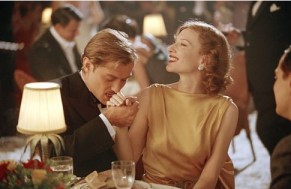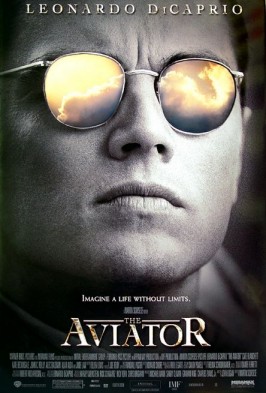|
The
Aviator
Praising The Aviator is no easy feat with Martin
Scorsese’s track record. Inarguably one of the greatest
cineastes of his generation, Scorsese has maintained one
constant throughout each of his projects, and that is to
make each subject he tackles his own, and The Aviator
is no different.
If you
step back in time to 1990, post Goodfellas, you
will find Scorsese poised with the world at his fingertips,
figuratively speaking. However, with such a worthy filmography,
where else is there left to go? That film had failed to
reward the auteur with his first Oscar statuette for Best
Director, and it was back to the drawing boards once again.
Age
of Innocence successfully illustrated Scorsese’s
range in regards to subject matter, perhaps in response
to claims that the violence associated with much of his
work had barred him from the prize in the past. However,
unlike some of his previous films he was not rewarded with
another nomination in the Best Director category.
What
followed seemed to be a trend carrying the director through
the rest of the decade, with a string of films that seemed
to fall just short of box office gold and declining audience
reprieve. What should have been lauded as a return to familiar
territory in Bringing Out the Dead was instead
panned as a snooze-project. Love it or hate it, the film
seemed unfairly dismissed.
Over
time, Scorsese’s projects moved from smaller more
personal films circling themes of guilt and redemption while
remaining rooted in urban human struggles to bigger budgeted
sprawls of increasingly larger scope. The talk among many
is that Scorsese’s next step needs to be cemented
back into projects smaller in ilk and closer to the director
on an intimate level.
Fair
enough, but wasn’t that the purpose behind Bringing
Out the Dead?
Gangs
of New York was plagued enough as it is, being overburdened
with interference on behalf of Harvey Weinstein. Okay, perhaps
“interference” is a touch to confrontational.
Needless to say, opinions regarding budget and scope seemed
to clash with Scorsese’s ultimate vision for Gangs.
Regardless, the film seemingly marked a step towards a creative
rebuild for Scorsese, or so enthusiasts hoped prior to the
announcement of his next project, a biopic focusing on the
life of Howard Hughes (Leonardo DiCaprio).
This
brings us full circle to The Aviator. A film that
appeared to be nothing short of cringe-worthy a month ago
has utterly “wowed” me. Granted, this is no
feat for Scorsese, as the film is no masterpiece by any
means. Yet it still seems to fire on all cylinders, remaining
detailed in scope without ever bogging down or failing to
entertain. From the very moment the film begins, it moves
at a pace that is embracing and exciting all at once.
 |
It’s
no mystery that Scorsese truly loves the cinema, as he has
documented clearly on several occasions. Yet here, for the
first time, it feels like he is making a film that falls
within the same vein as the films he grew up admiring as
a child. It occurred to me after an hour into the film that
this is the first time Scorsese has tackled the process
of film production outside of several of documentaries or
specials focusing on his own work. Granted, Hughes is hardly
a pinnacle figure of filmmaking, yet Scorsese infuses a
genuine love for the process in which Hughes develops to
film the dogfight sequences in his war epic, Hell's
Angels.
In all
his struggles to produce a big budget film that hits its
mark with both critics and audiences, The Aviator
is the closest Scorsese has come to achieving this goal,
and it’s an enjoyable ride throughout. Some have ballyhooed
the degree (or in some cases, lack) of attention paid to
Hughes’ descent into mental illness, in his case Obsessive
Compulsive Disorder, yet rather than gloss over the disease,
Scorsese has dealt in subtle brush strokes, detailing enough
to feel accurate while not becoming too bogged down in technicalities.
Overall,
performances help out this endeavor. DiCaprio at first appears
to look too young to fill Hughes’ shoes, but ultimately
pulls off the necessary notes of turmoil and age respectfully.
Despite his deft performance, it is Kate Hepburn (Cate Blanchett)
that truly steals the show. The spirit of Hepburn is alive
and well in Blanchett’s capable hands. She truly “gets”
the appeal behind the actress while revealing vulnerability
and struggle nestled discreetly beneath her rough exterior.
Hopefully,
The Aviator will find its place somewhere amidst
the other holiday releases during the award season, even
if it isn’t the piece of groundbreaking cinema many
have been hoping to see out of Scorsese as of late.
Rating:

|







